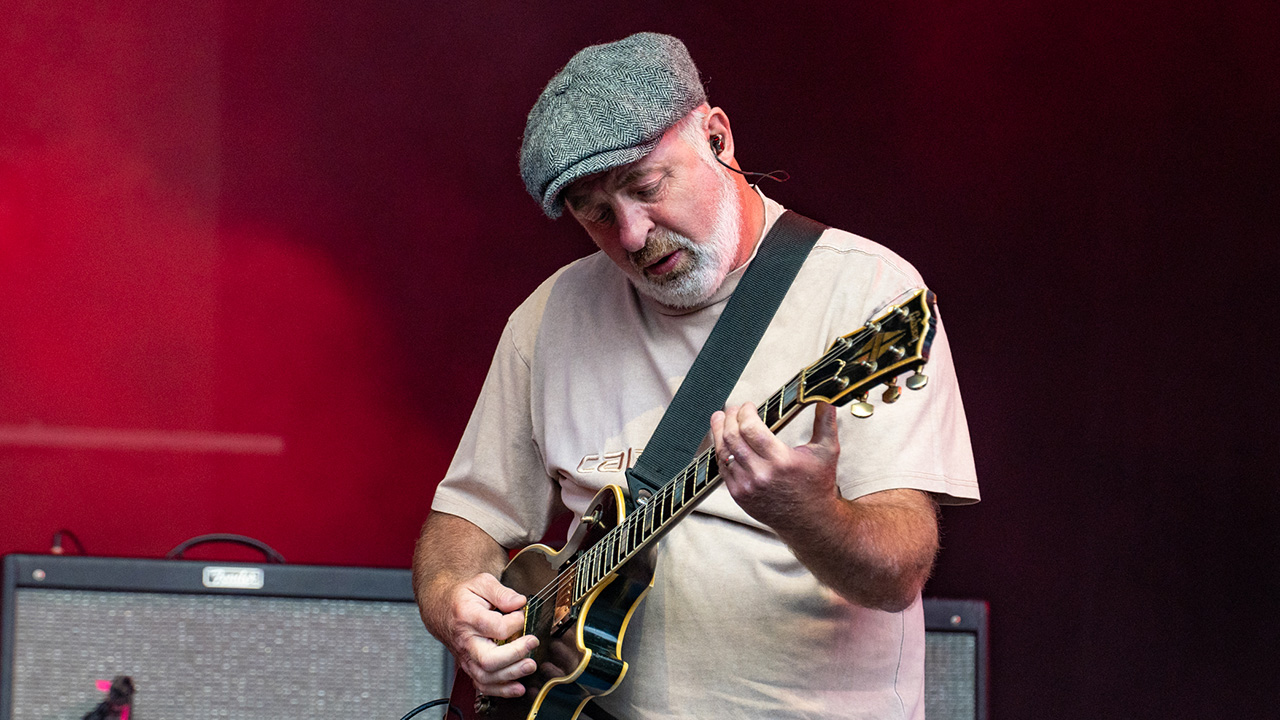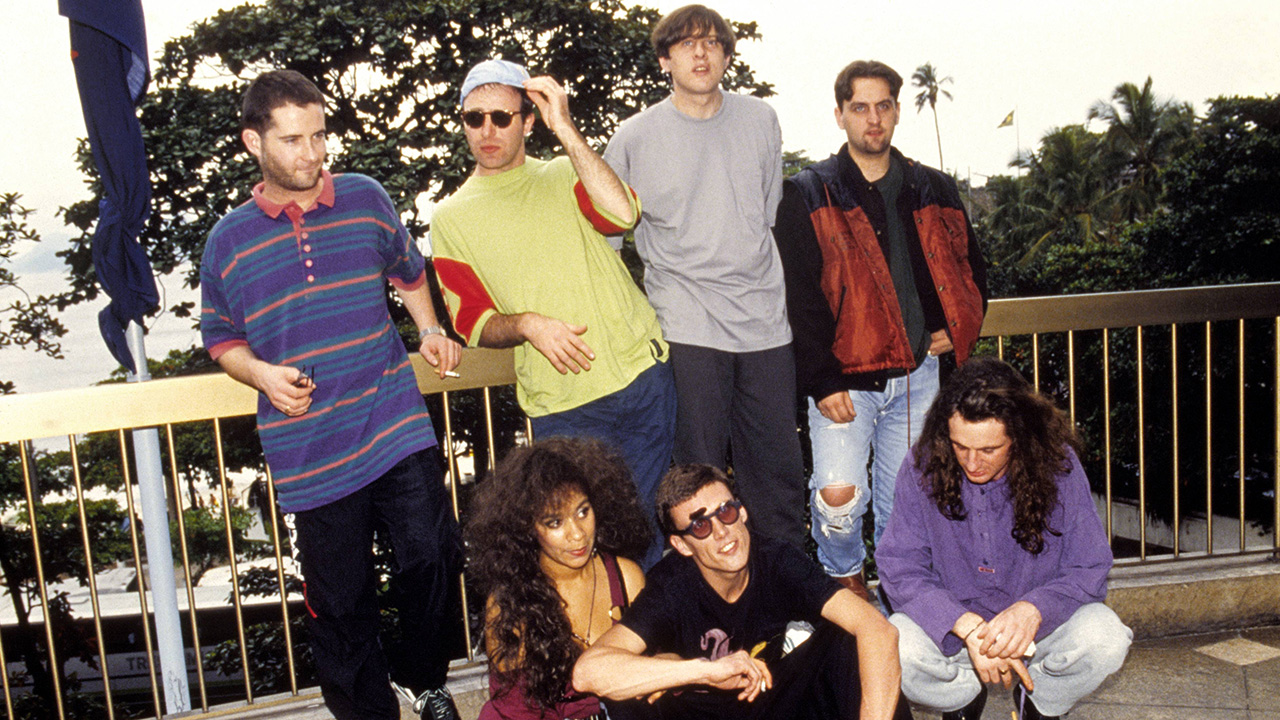
Acting as a bridge between Manchester’s ‘80s indie rock scene and the upcoming Madchester rave wave, the Happy Mondays’ blend of house, funk, and psychedelia proved iconic. When Madchester gave way to Britpop, the change further cemented the Mondays’ legacy as genre-bending pioneers.
But while in-your-face frontman Shaun Ryder often gets the most attention, Mark Day, a guitarist bred in simplicity, defined the group’s sound. Despite the soupy mix of genres he waded through with the Mondays, his origins were decidedly typical. “My mum was the first one to influence me to play an instrument,” he recalls. “She said, ‘Nobody here really plays an instrument.’ So I wanted to prove her wrong!”
He continued: “As far as style, it was just a case of checking out every fucking guitarist I could get my ears on. It was the greats like Frank Zappa, Jimi Hendrix, David Gilmour; I could name all of them, and I was hungry for knowledge. But I’ve never been able to perfect what they did – I just learned what I could and remained in the shadows."
Via foundational records such as 1988’s Bummed and 1990’s Pills ’n’ Thrills and Bellyaches, Day and his mad-scientist cohorts burst upon the scene, quickly rising to the high point of headlining the Glastonbury Festival in 1990.
“The thing with my sound is it’s very basic and simplistic,” he tells Guitar World of his contribution to the band. “I’ve never been one to go to shops and buy boutique stuff; I’m not a guitar nerd. So if you want to know the ins and outs, don’t ask me!
“I’m not technical; I always struggle with how I do stuff – even live. And for that show, and any other show, I rely on my tech to ensure things are working.”
He claims: “There’s no secret. There’s no magic to it. I don’t want too many knobs – I've had too many knobs, and man, it’s a pain in the fucking ass. I’m sure that, during that show, I had my Mesa/Boogie and probably a Fender Twin, with the least number of buttons possible! I remember Marshall came in and we tried them out, but they were too confusing. I kept everything dead simple back then, and still do.”
The Mondays fractured in 1993 but reunited in 1999, 2001, and 2004 – all without Day. After 17 years away from his instrument, he climbed aboard again in 2012, remaining ever since. But while things seem rosy enough on the live end of things, no new music has featured Day since 1993’s Yes Please!
“It would be nice to make another record, but it’s not down to me – it’s down to the singer. Who knows? I think Shaun has got bigger ideas and wants to do different things. It would be nice to do one more. I can hope, but I honestly don’t know.”
What led to the eclectic approach you applied when you formed the Happy Mondays?
“To be honest, it just happened. I was never very critical of what I was doing, nor was anybody else. I didn’t experiment much with sounds; it was more about getting down to playing so I could develop a style that was my own. That came by messing about – I was never one for the technical side of things or playing through boutique boxes.”
But you must have used some pedals to create those sounds, right?
“I did, but it was just basic flange or chorus boxes. I would experiment with those, add new sounds and mess with different boxes, computers, and even keyboards. A big wave of technology washed through as we started, changing our craft. Just look at Depeche Mode – the tech they were using at the time was wild, so it was a struggle to get that to the forefront. I had to adapt.”
What guitars were you working with, and what sounds were you after back then?
“When I first met Paul and Shaun [Ryder], I bought a new Aria Pro II with a proper guitar case. It was like a Gibson-style copy, meaning it had the same shape but still its own thing. That guitar was my pride and joy for a bit.”
And how about amps?
“God, I can’t remember, man. It could have been a Fender or some cheap thing. I seem to remember it being some privately made thing. I had met this guy who introduced me to these amps that Allan Holdsworth had used at one point – it was this weird one, and I can't remember what the hell it even was.
“But I kept switching between valve and circuitboard amps because I couldn’t decide. I would have gone with whatever was most reliable then.”
What was it like working with John Cale on Squirrel and G-Man Twenty-Four Hour Party People Plastic Face Carnt Smile (White Out)?
“I can remember John Cale well. He was a nice guy, and he had his tentacles in things and did many things that I wouldn’t even know about! He was great – it gave us a lot of experience.
“I always remember him coming into the studio one day, looking at my fingers while I was trying to work out something, and he said, ‘Why are you doing it that way?’ But I don’t know! If people didn’t like it, tough shit. Kind of arrogant, but there you go!”
Were you still using the Aria then?
“I had my Fender Jag by then. I was always trying to do things differently than others. I always preferred to play major and barre chords; I was trying to look at ways of getting harmonies out of a scale to be different. I don’t know if I succeeded… I must have because I’m doing it that way all these years later. As for the rest of the sessions, they’re clouded by the usual Happy Mondays antics of years ago!”
Was it difficult to bring the guitar to the forefront during the recording of Bummed, which veered toward acid and house music?
“Not really. I used that same Fender Jag on that one. I try to avoid getting influenced by other sounds outside of what I’m trying to do. I never listened to any of that before we did Bummed, and I tried not to add other things in from others before writing a song.
“But you still add influences through the typical plagiarism one does, you know? You listen to something, try and write it out while trying not to copy things, and go, ‘Gosh, that kind of sounds like this or that.’ It used to get on my tits when I’d spend hours coming up with a riff, only to hear, ‘It sounds like this one…’ and I’d go, ‘Shit… you’re right.’”
After the Happy Mondays broke up in ’93, bands like Oasis sang your praises. That must have been gratifying.
“No, because I just walked away from the music industry when we split up. I didn’t even listen to any music. I didn’t know who Oasis was – really. I had heard that they were sweeping up what we were and were a product of the Manchester scene we created.
I had tried to do some other projects, but they all sounded like Mondays. I couldn’t change or escape my style. But when I got the call, I said to my daughter, ‘It’s up to you. Should I?’
“Oasis got the prize for everything, didn’t they? And hats off to them. I just walked away. I wanted to get away from the drug scene; everybody was off their heads. So I spent years in the abyss, meaning I got a real job.”
And what brought you back from the abyss?
“In 2012, Mark [Berry] and the singer contacted me, and I said, ‘Well, I’ve not played in a long time.’ I was teaching music, but I’d not played guitar for around 17 years. I put all my guitars in the loft and never touched them.

“I didn’t think I knew how to play anymore; I’d just said, ‘Fuck it. I’m going to be normal – I need to detox.’ I needed to get away from the scene, and like I said, I stopped listening.
“I had tried to do some other projects, but they all sounded like Mondays. I couldn’t change or escape my style. But when I got the call, I said to my daughter, ‘It’s up to you. Should I?’ She said, ‘Yes,’ and I did.
“Luckily, after 17 years, I could remember; it all returned to me. But now I’ve written it down just in case I get Alzheimer’s. It’s tabbed out and secure. It was tough but worth it.”
What’s your greatest point of pride when you look back?
“Just that I was a part of something. I’ll never forget coming back from the train after recording Pills ’n’ Thrills and Bellyaches, thinking, ‘This is gonna go somewhere.’ I felt jubilant. And it was silly, you know? You propose to your girlfriend, thinking, ‘I’ve made it!’ Then, two years later, the band splits up and you’re in debt.
“But I am thankful. There are a lot of bands who were involved in creating that vibe, meaning the rave scene, but we’ve probably influenced a lot of up-and-coming bands. I hope we have.
“It’s nice to be involved with that legacy – I’m proud of it. It’s funny, though: at the time, I hated it. Now I look back and think, ‘Wow, I was so lucky to have been a part of something special.’”







